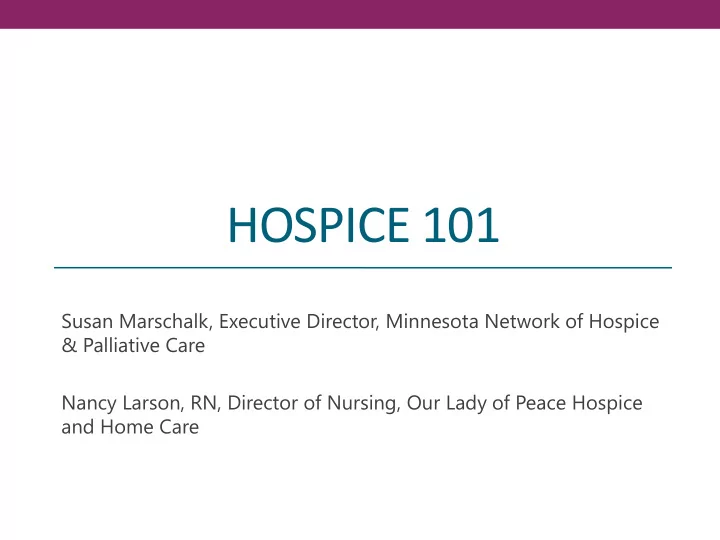

HOSPICE 101 Susan Marschalk, Executive Director, Minnesota Network of Hospice & Palliative Care Nancy Larson, RN, Director of Nursing, Our Lady of Peace Hospice and Home Care
Definition of Hospice • Hospice is a special way of caring for people living with life-limiting illnesses. Hospice care provides physical, emotional, and spiritual support for patients and their families in whatever setting they call home. • This presentation will define hospice and palliative care, describe hospice care services, explain eligibility criteria for hospice and the benefits of early admission, and discuss how hospices services are paid for.
OBJECTIVES • Describe hospice services and eligibility criteria • Describe how hospices services benefit patients and their families • Discuss the Hospice Medicare Benefit
Hospice • Provides support and care for those in the last phases of a life-limiting illness • Recognizes dying as a part of the normal process of living • Affirms life and neither hastens nor postpones death • Focuses on quality of life for individuals and their family caregivers
Core Aspects of Hospice • Patient/family focused • Interdisciplinary care team • Provides a range of services: – Interdisciplinary case management – Medications – Durable medical equipment – Supplies – Volunteers – Grief Support
Who may need hospice? Someone experiencing: Difficulty swallowing • Increasing shortness of breath • Recurrent infections • Spouse or family member experiencing coping • issues
Who may need hospice? Someone experiencing: Frequent hospitalizations/ED visits • Progressive weight loss • Uncontrolled pain, nausea and vomiting • Increasing need for assistance in Activities • of Daily Living (ADLs) Decline in mental status •
Medicare Hospice Guidelines Life limiting illness (6 months or less prognosis, if the disease takes its normal course) and diagnosis meets Medicare Hospice criteria *Determination is made by combination of physician order and hospice assessment
Medicare Hospice Guidelines • There are many hospice eligible diagnoses. Each has its own unique criteria for eligibility. Most common: --Cancer (27.2%) --Heart Related (18.7%) --Dementia (18%) (NHPCO, 2017)
Medicare Hospice Guidelines • Do Not Resuscitate/Do Not Intubate • Live in service area • Consent to accept services
Hospice Recertification • 2 - 90 day certification periods followed by 60 day periods. • Can go on as long as the patient continues to be deemed hospice appropriate (aka is assessed to have a prognosis of 6 months or less)
Who pays? • Medicare • Medicaid • Insurance • Private Pay • Sometimes a combination of these
Where is hospice provided? Wherever a person resides - Private Homes (55.6%) Nursing Facility (41.9%) Hospice Inpatient Facility (1.3%) Acute Care Hospital (0.5%) Statistics from NHPCO Hospice Care in America - 2017
Hospice Providers • Many in Minnesota! (Over 100) • All must be licensed. 2/3 are also Medicare Certified • Offer same essential services with mild variations • Important thing to remember is that patients/families have the right to pick ANY hospice provider they chose within their service area. Hospice Compare (https://www.medicare.gov/hospicecompare/)
Hospice Team Primary physician • Hospice physician (medical director) • Nurses • Home Health Aides • Social workers • Clergy/chaplains • Massage, music therapy • Volunteers • Bereavement Staff •
Hospice Provides • Comfort care – including comfort medications, support and respite • Manages pain and symptoms • 24 hour availability to answer questions and offer support • Teaches the family how to provide care • Emotional, psychosocial, spiritual and bereavement support • Durable Medical Equipment (i.e. specialized mattresses, O2, wheelchairs, etc.)
Spiritual Care & Hospice • All staff trained in spiritual care and prayer • Sacraments are made available • Prayer visits upon request • Assistance with funeral planning
Bereavement Services Provided for 13 months following the death of • loved one on hospice service May also include pre-bereavement if grief risks • identified by staff Including but not limited to: phone calls, • mailings, support groups, special memorial events, workshops.
Palliative Care Definition • Palliative care is integrative, whole person care for patients with serious illnesses. Palliative care can help with pain, stress, and other symptoms and can be provided at any time during a serious illness. • Similar to hospice, palliative care is provided by a team of doctors, nurses, therapists, and others. Also similar to hospice, palliative care provides support to the family and loved ones of a patient experiencing serious illness. MNHPC - You Are a Bridge (Palliative Care Video) https://youtu.be/hQzzuWgrFaM OR https://www.mnhpc.org/palliative-care
MN Network of Hospice & Palliative Care (MNHPC) Minnesota Network of Hospice & Palliative Care (MNHPC) is the state's leading hospice and palliative care network. We bring providers, business partners, and individuals together to increase knowledge, access services, and strengthen advocacy for people living with a serious illness or experiencing the end of life.
MNHPC’s Mission • We strive to ensure that everyone has the help they need to live and die according to their wishes. We do this through education and advocacy around serious illness and end-of-life care.
What MNHPC does • MNHPC offers educational conferences and forums and webinars for health care professionals • MNHPC’s role includes convening, educating and advocating • MNHPC designs programs for the broader community.
2020 Annual Conference April 5-7, 2020 Saint Paul RiverCentre
Spring Symposium Monday, April 6, 2020 6:30-8:30 PM Saint Paul RiverCentre
Hospice & Palliative Care Resources Minnesota Network of Hospice and Palliative Care (MNHPC) National Hospice and Palliative Care Organization (NHPCO) Our Lady of Peace Hospice and Home Care
Recommend
More recommend